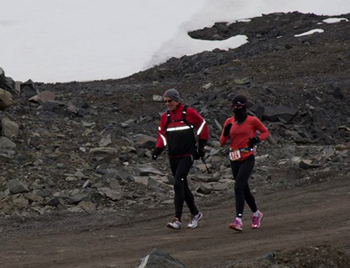Faculty members Matthias Henze, Mikki Hebl complete 26.2-mile challenge in Antarctica; Henze completes seven-continent marathon challenge
The icy tundra of Antarctica conjures many images: penguins, snow, winter storms and bulky snowsuits. With its cold, dry and windy weather and high elevation, it is not a place that most people would picture as an ideal destination for running, particularly long-distance running.
But at Rice, an institution recognized for its “unconventional wisdom,” faculty members take on unconventional challenges. And that’s exactly what marathoners Matthias Henze and Mikki Hebl did this semester by running a marathon in one of the coldest places on Earth — Antarctica, where the mean annual temperature is -70 degrees Fahrenheit. Hebl, a professor of psychology, ran the marathon Jan. 26 with a finish time of 4:30 (Hebl’s personal record is 3:24); Henze, the Watt J. & Lilly G. Jackson Professor in Biblical Studies, ran March 10 and finished in 6:14 (Henze’s personal record is 3:26). Both runners noted that Antarctica runs can take an hour or longer than average run times due to course difficulty, altitude and other factors.
It was a proud moment for Henze, who took up running at the age of 40 and finished his first marathon in 2006 in Houston.
“There is nothing like crossing the finish line of a marathon!” he said.
It wasn’t long before Henze was hooked; he joined the Seven Continents Club, a group for people interested in completing a marathon on each of the seven continents. His first international race was in Paris in 2007, followed by runs in Santiago, Chile; Rotterdam, The Netherlands; Kilimanjaro, Tanzania; Tokyo, Japan; Sydney, Australia; and finally King George Island, Antarctica. To date, he has completed 20 marathons in the U.S. and abroad.
“I love to travel and I love to run,” Henze said. “Running in a city you don’t know is the perfect way to get a feeling for the place. I have met amazing people on my trips, people who travel all over the world, literally, to run races in every conceivable place. Runners form a close community, we give each other a lot of encouragement, and it is very easy to make friends.”
While the Antarctica race marked the completion of Henze’s attempt to run on all seven continents, it was the first international marathon for Hebl, who began running marathons in 1993. In 2000, she joined the 50 States Marathon Club and in 2011 completed her quest to finish 26.2-mile races in all 50 states. To date, she has completed 63 marathons.
Like Henze, Hebl enjoys the camaraderie of running.
“Runners are a special kind of breed,” she said. “They’re generally down-to-earth and supportive of each other. It’s a real band of brothers and sisters.”
Both Henze and Hebl described the Antarctica race as extremely challenging.
“Undoubtedly, it was the greatest physical challenge of my running career,” Henze said. Hebl agreed, describing the terrain as a “tremendously difficult course” that was “punctuated by hills with snow, some mud spots, some sharp rock spots and some loose rocks.”

Matthias Henze displays his finisher medal following his completion of marathons on each of the seven continents (Photo courtesy of Matthias Henze)
Despite the difficulty of the race, Hebl ran her second international marathon just 24 hours later: She traveled to Punta Arenas, Chile, for her first South American marathon, which she said was “flat and felt very easy post-Antarctica.”
“I guess I am now officially on a journey to do all the continents!” Hebl said.
Both Henze and Hebl appreciate the moments made possible through marathoning.
“During my marathon in Tanzania, Africa, I traveled all over the country and fell in love with the amazing beauty of East Africa,” Henze said. “In Australia, I connected with the vibrant academic communities along the East Coast, gave three talks in different places and will continue to collaborate with my colleagues in Sydney. And in Antarctica, I traveled on a boat from the southern tip of Argentina with 100 fellow runners, visited with the penguins, smiled at the whale that came right up to my kayak in the icy waters and marveled at the dark blue of the glaciers and the majesty of the icebergs.”
Henze said his favorite race is the New York City Marathon, which he calls “the greatest foot race in the world.”
“It’s 50,000 runners from all over the world, running in three great waves through the five boroughs and finishing in Central Park on a glorious and crisp New York City fall day,” he said.
Hebl said her previous marathons, including her 50 states experience, made her “appreciate the distinctiveness of each marathon.”
“It reminded me of Woody Guthrie’s song ‘This Land is Your Land,’ which just made me appreciate the East and West, North and South – our beautiful country,” she said.
Both Henze and Hebl describe marathoning as “a great metaphor for life.”
“You have a clear objective – to make it to the start line,” Henze said. “Racing requires preparation and endurance, with multiple obstacles along the way, such as bad training days and injuries. You try hard to feel confident when finally on race day you walk up to the start line. Some races will be glorious and incredibly rewarding, while many will be a disappointment. You always pick yourself up, regardless of how the race went, you heal, and then you start training again.”





Leave a Reply